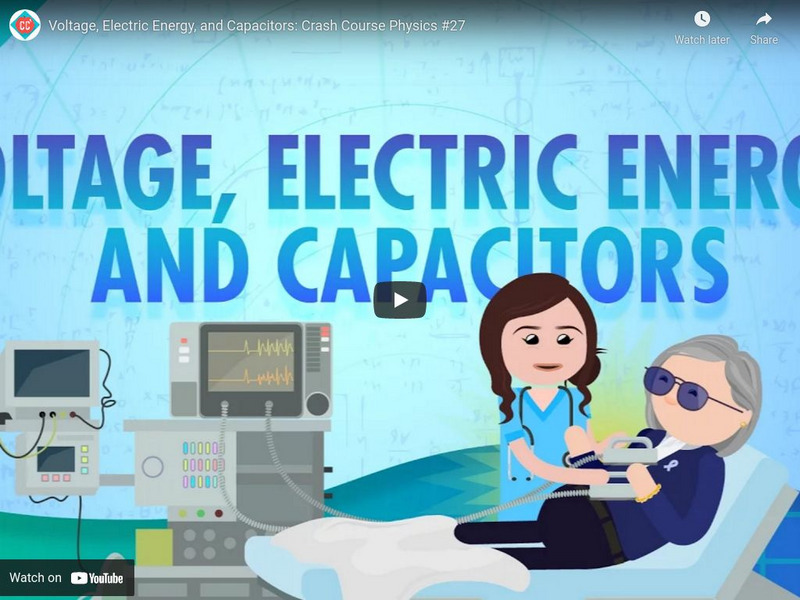Professor Dave Explains
Neural Conduction, Action Potential, and Synaptic Transmission
We have probably heard that neurons are the cells that transmit information around the body. But how does this work? Is it actual electricity? Like from the wall socket? What is a synapse? What happens there, in between one neuron and...
Curated Video
Why Are Resistors Used
In this video, we're going to answer the question: Why are resistors used?
Flipping Physics
LR Circuits - Review for AP Physics C: Electricity and Magnetism
AP Physics C: Electricity and Magnetism review LR circuits including the basics of how an LR circuit works, the limits, derivations of current as a function of time and time rate of change of current as a function of time, graphs of both...
Flipping Physics
Conductors in Electrostatic Equilibrium - Review for AP Physics C: Electricity and Magnetism
AP Physics C: Electricity and Magnetism review of Conductors in Electrostatic Equilibrium including: defining conductors which are in electrostatic equilibrium, deriving the electric field inside the conductors, electrostatic shielding,...
Flipping Physics
RC Circuits - Review for AP Physics C: Electricity and Magnetism
AP Physics C: Electricity and Magnetism review of RC circuits including: defining RC circuits, charging a capacitor through a resistor, determining the limits for charge and current, deriving charge and current as functions of time,...
Flipping Physics
Electric Potential - Review for AP Physics C: Electricity and Magnetism
AP Physics C: Electricity and Magnetism review of Electric Potential including: derivation of electric potential energy, derivation of electric potential and electric potential difference, a discussion of the electronvolt, electric...
Flipping Physics
Electric Dipole Equipotential Lines
Demonstrating the equipotential lines of an electric dipole.
Flipping Physics
Inductance - Review for AP Physics C: Electricity and Magnetism
AP Physics C: Electricity and Magnetism review inductance, inductors, and self-inductance. The equation for the inductance of an ideal solenoid is derived. The differences between resistance, resistors, resistivity, inductance,...
Professor Dave Explains
Electrochemistry
How does a battery work? Now that you think about it, you have no idea, do you? Well take a gander! Turns out it's just redox chemistry.
Curated Video
Ohms Law Explained - The Basics Circuit Theory
Ohms Law Explained. In this video we take a look at Ohms law to understand how it works and how to use it. We look at voltage, current, resistance and the relationship between these. We also use ohms triangle to solve examples.
Curated Video
How does an Electric Motor work? DC Motor explained
DC Motor explained - in this video we look at how does a dc motor work to understand the basic working principle of a DC motor. We consider conventional current, electron flow, the winding, armature, rotor, shaft, stator, brushes, brush...
Flipping Physics
Electromagnetic Induction - Review for AP Physics C: Electricity and Magnetism
AP Physics C: Electricity and Magnetism review of electric flux to understand magnetic flux, an example of magnetic flux through a current carrying wire loop, Gauss’s Law for Magnetism, electromagnetic induction, Faraday’s law, Lenz’s...
Professor Dave Explains
Electric Potential, Current, and Resistance
Whenever you plug something into an electrical socket, don't you wonder what's going on? Well you should, as it's pretty neat. What is electricity made of? How did we figure out how to harness this power? Let's take a look!
Professor Dave Explains
The Mechanism of Muscle Contraction: Sarcomeres, Action Potential, and the Neuromuscular Junction
We've learned about the types of muscle, including skeletal muscle, and we know then when these muscles contract, we are able to move our bodies around. But how exactly does this happen on the molecular level? There is an astonishing...
Khan Academy
Khan Academy: Electrostatics: Electric Potential Energy
Get introduced to electrical potential energy by relating it to the concept of gravitational potential energy in this video. Learn how to calculate the amount of work it takes to move a charge through an electric field. [12:36]
Crash Course
Crash Course Physics #27: Voltage, Electric Charge, and Capacitors
So, how do those defibrillators you see on TV actually work? Surprise! Physics can explain! Okay buckle up, everyone! In this video episode of Crash Course Physics, Shini has the task of breaking down Electrical Potential Energy,...
Khan Academy
Khan Academy: Electricity and Magnetism: Electric Potential Energy (Part 2)
Explains the electric potential energy difference in a varying field. (Involves Calculus)
Khan Academy
Khan Academy: Electric Power
In this video, David from Khan Academy derives the formula to find the power used by a resistor. [10:42]
Khan Academy
Khan Academy: Voltage
A video explaining the difference between electrical potential (voltage) and electric potential energy. Learn that electrical potential energy is associated with a charge and electric energy is associated with a position. [8:55]
Khan Academy
Khan Academy: Electric Potential Energy (Part 2 Involves Calculus)
Sal Khan explains electric potential energy difference in a varying field in this video.
Khan Academy
Khan Academy: Electric Potential Energy of Charges
In this video, David from Khan Academy explains how to find the electric potential energy for a system of charges and solves an example problem to find the speed of moving charges. To see the calculus derivation of the formula watch this...
Khan Academy
Khan Academy: Electric Potential Charge Configuration
In this video, David from Khan Academy shows how to find the total electric potential at a point in space due to multiple charges.
Khan Academy
Khan Academy: Electric Field Direction
The direction of an electrical field at a point is the same as the direction of the electrical force acting on a positive test charge at that point. This video demonstrates how to solve electrical field problems. [12:35]
PBS
Pbs Learning Media: Crash Course Physics: Resistors & Batteries
Batteries power much of your daily life, so today we're going to talk about how they work. We're also explaining how terminal voltage results from the natural internal resistance of every real battery. [9:55]










